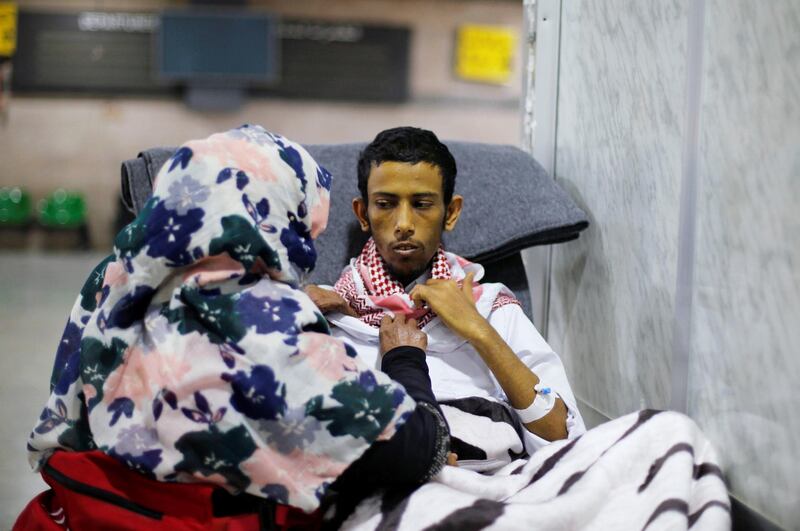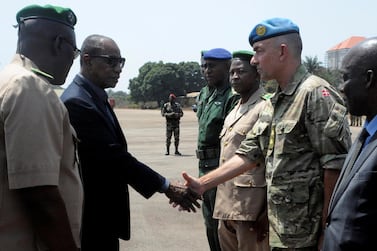The leaders of Yemen’s Houthis have approved the release of a Saudi soldier suffering from deteriorating health, in a move celebrated by the UN.
The International Committee of the Red Cross, overseeing the prisoner swap, confirmed the transfer of a Saudi national from Sanaa to Riyadh.
The ICRC said that the man was accompanied by two staff members and that it came after several visits in recent days to assess his health and make sure he was well enough to travel. The ICRC did not name the man.
“We are pleased that this person has now returned home and we continue to offer our services so that thousands more people can return to their families”, said Fabrizio Carboni, the ICRC’s Regional Director for the Near and Middle East.
“This is an important step to continue building confidence among warring parties in Yemen”, he added.
The UN special envoy to Yemen's office reported that Martin Griffiths also welcomed the news.
"The special envoy welcomes the unconditional release... of the sick Saudi prisoner," Mr Griffiths' office tweeted.
"The special envoy hopes to see more similar humanitarian gestures from the parties."
The SE welcomes the unconditional release by AA of the sick Saudi prisoner, whom the ICRC will transfer from Sanaa to Riyadh today. The SE hopes to see more similar humanitarian gestures from the parties. #Yemen
— @OSE_Yemen (@OSE_Yemen) January 29, 2019
It posted a video of a man in a stretcher being carried onto a Red Cross jet.
The Houthis named the soldier as Musa Al Awaji in a report on their Al-Masirah TV. It said the Saudi was freed "without collateral as a humanitarian gesture".
Sources in Sanaa told The National that Mr Al Awaji was captured by the Houthis in the border area near the Saudi town of Najran two years ago and suffers liver problems that require better treatment than he is able to get in Yemen.
It is unclear if Mr Awaji is the first prisoner to be released under a deal agreed between the Saudi-backed government and rebels at UN-brokered peace talks in Sweden last month.
The two parties have agreed to exchange 15,000 detainees and have submitted lists of prisoners' names to UN mediators. The two sides then met together with the ICRC in Amman to negotiate logistics and finalise the lists.
For nearly four years, Yemen's Iran-backed Houthi rebels have been locked in a war with the government based in Aden who is backed by a Saudi led alliance.
The conflict has triggered what the UN calls the world's worst humanitarian crisis, with millions of people at risk of mass starvation.
In December, a delegation from the government and the rebels met face to face in Sweden after months of back and forth by Mr Griffiths. They agreed a deal to avert the government forces, backed by the coalition, pushing a full offensive into the Red Sea port city of Hodeidah.
Since it came in to effect on December 18, the Hodeidah truce has "largely held" but sporadic fighting has flared between two sides, suggesting that the UN is struggling to implement the agreed withdrawal of troops.
Mr Griffiths admitted this week that the implementation period had been too ambitious as neither side has yet taken the step of pulling back their forces, missing a January 7 target.
Retired Danish general Michael Lollesgaard will now take over from Patrick Cammaert who set up the UN's observer mission for the ceasefire. He will brief Mr Griffiths of any violations committed by either side and oversee the deployment of addition monitors after the UN Security Council unanimously agreed to bump the mission up to 75 observers for a six month period.
Yemen’s government say that the Houthis haven’t handed control of the port to the civilian coast guard but have given it to groups run and manned by loyalists.
Hodeidah is the entry point for around 70 per cent of Yemen's humanitarian aid and the bulk of food imports.
Four years of war following the rebel seizure of Sanaa in 2014 have left more than 22 million Yemenis – 75 per cent of the population – dependent on aid, according to UN agencies. Famine has been declared in a number of areas and there have been outbreaks of cholera.
The UN fears that a full-blown conflict in Hodeidah will cut off the flow of aid to people in need, endangering millions of lives.
On Monday, the UN official extended the deadline for the deal, allowing Mr Lollesgaard time to push for progress once he takes over.







